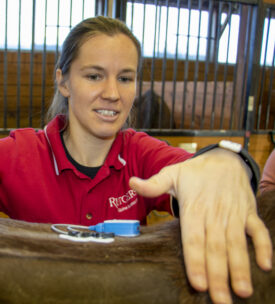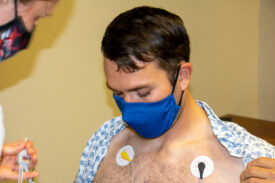
Ellen Rankins placing surface electromyogram units (sEMG units) on the horse to measure muscle activity. These units will be used on both the horses and veterans to assess muscle tension during their interaction.
Each year, the Equine Science Center at Rutgers University hosts its annual “Evening of Science & Celebration.” This event celebrates the year’s achievements, showcases current research, and awards members of the equine community for their accomplishments.
Hosted this year on November 11, Veterans Day, doctoral candidate, Ellen Rankins, is presenting on her large-scale research project focusing on Equine Assisted Services (EAS) for veterans with Post-traumatic Stress Disorder (PTSD). Rankins, a graduate student in the endocrinology and animal biosciences program in the Department of Animal Sciences at Rutgers, is conducting this project as her doctoral research.
While originally slated to start in 2020, COVID-19 put her research on pause. After over a year of planning, fundraising and navigating the difficulties of conducting research during a pandemic, she was finally able to start her project in September 2021, coinciding with the beginning of the semester and students returning to campus.
Rankins’ research project examines equine and human health in the treatment of PTSD, specifically within the New Jersey veteran population. The study will investigate the interactions between both the horses and humans, and measure stress indicators over time. It is her hope that through this investigation into this “horse/human bond” we will better be able to understand how they affect one another.

Doctoral candidate Ellen Rankins places the leads of an electrocardiogram unit or ECG unit on the control subject during a pre-testing session.
Data is collected using telemetric electrocardiogram (ECG) units, electromyography (sEMG) units, and blood sampling. The ECG data will provide information on heart rate and heart rate variability, which can be used to investigate stress-related effects on the heart; the EMG data will provide information on muscle activity—specifically the tensing of muscles that are thought to show a stress or relaxation response; and the blood sampling will provide data on hormones that are attributed to either stress or relaxation.
All sampling is conducted simultaneously on both the horse and the veteran, which will provide concurrent data points to examine the “synching” of both the horse and human over the course of the project.
While Rankins has started her research with the participants enrolled thus far, the size of her study is projected for120 participants. This large study size aims to provide the most accurate data, with as few variables affecting the results as possible.
 Rankins is still seeking participants for the study: males between the ages of 18-75, including veterans with PTSD, veterans without PTSD, and non-veterans. The non-veterans are paired with a veteran in the pre-testing phase (prior to the veteran working with the horse) in order provide baseline information for each veteran’s personal demographic information. For more information about the project, Rankins asks that volunteers contact her at: (848)-932-3761 or rutgerseaat@njaes.rutgers.edu.
Rankins is still seeking participants for the study: males between the ages of 18-75, including veterans with PTSD, veterans without PTSD, and non-veterans. The non-veterans are paired with a veteran in the pre-testing phase (prior to the veteran working with the horse) in order provide baseline information for each veteran’s personal demographic information. For more information about the project, Rankins asks that volunteers contact her at: (848)-932-3761 or rutgerseaat@njaes.rutgers.edu.
The project is a partnership with statewide stakeholders including: the New Jersey Department of Military and Veterans Affairs; Special Strides located in Monroe, NJ (where the sessions will be conducted); the Graduate School of Applied and Professional Psychology at Rutgers University; the Office of Veteran and Military Programs and Services at Rutgers; and the Rutgers Business School – Military and Veteran Engagement Programs.

